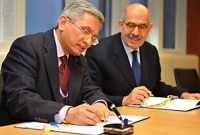The nuclear safeguards agreement between India and the International Atomic Energy Agency (IAEA) was signed in Vienna yesterday.
|
| IAEA director general Mohamed Elbaradei watches Indian Ambassador Saurabh Kumar sign the document yesterday |
The development of nuclear safeguards in India was a key element in one of the major recent changes in the global nuclear industry. Negotiated over nine months from November 2007, the agreement was passed by the IAEA board and later accepted by the Nuclear Suppliers Group. These were the preconditions necessary for individual nations to draw up nuclear cooperation deals with India and then begin international trade.
The trade links with India are now being cemented, and the country is expected to place orders with every one of the global reactor suppliers. It is also making deals for future uranium supplies, having suffered shortfalls from domestic sources for many years.
Safeguards are a main plank in the global nuclear security regime because they allow the IAEA to make sure that nuclear materials like uranium and plutonium in the civil power sector are never used in military programs. For most countries, a comprehensive safeguards agreement comes in parallel with the Nuclear non-Proliferation Treaty, but India always refused to sign this. When the Nuclear Suppliers Group began to insist on comprehensive safeguards in 1992, India was isolated from international trade.
Four Indian reactors are already under a pre-existing item-specific safeguards agreement, while the others will come under safeguards over time under this new one. The IAEA will begin to oversee nuclear materials at the sites once it recieves written notification from Indian officials that necessary preparations and statutory changes have been made. In successive phases India will then make detailed declarations of its nuclear facilities and stocks of materials.
The reactors already safeguarded are Tarapur 1 & 2 and Rawatbhata 1 & 2, while the two under construction at Kudankulam fall under the same controls. Rawatbhata 5 and 6 should be among the first to come under the latest agreement, with Rawatbhata 3 & 4 following in 2010, Kakrapar 1 & 2 in 2012, and Narora 1 & 2 in 2014.







_15863.jpg)







